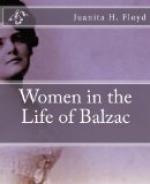Madame Surville has described Balzac’s mother, and her own, as being rich, beautiful, and much younger than her husband, and as having a rare vivacity of mind and of imagination, an untiring activity, a great firmness of decision, and an unbounded devotion to her family; but as expressing herself in actions rather than in words. She devoted herself exclusively to the education of her children, and felt it necessary to use severity towards them in order to offset the effects of indulgence on the part of their father and their grandmother. Balzac inherited from his mother imagination and activity, and from both of his parents energy and kindness.
Madame de Balzac has been charged with not having been a tender mother towards her children in their infancy. She had lost her first child through her inability to nurse it properly. An excellent nurse, however, was found for Honore, and he became so healthy that later his sister Laure was placed with the same nurse. But she never seemed fully to understand her son nor even to suspect his promise. She attributed the sagacious remarks and reflections of his youth to accident, and on such occasions she would tell him that he did not understand what he was saying. His only reply would be a sweet, submissive smile which irritated her, and which she called arrogant and presumptuous. With her cold, calculating temperament, she had no patience with his staking his life and fortune on uncertain financial undertakings, and blamed him for his business failures. She suffered on account of his love of luxury and his belief in his own greatness, no evidence of which seemed sufficient to her matter-of-fact mind. She continued to misjudge him, unaware of his genius, but in spite of her grumbling and harassing disposition, she often came to his aid in his financial troubles.
Contrary to the wishes of his parents, who had destined him to become a notary, Balzac was ever dreaming of literary fame. His mother not unnaturally thought that a little poverty and difficulty would bring him to submission; so, before leaving Paris for Villeparisis in 1819 she installed him in a poorly furnished mansard, No. 9, rue Lesdiguieres, leaving an old woman, Madame Comin, who had been in the service of the family for more than twenty years, to watch over him. Balzac has doubtless depicted this woman in Facino Cane as Madame Vaillant, who in 1819-1820 was charged with the care of a young writer, lodged in a mansard, rue Lesdiguieres.
After fifteen months of this life, his health became so much impaired that his mother insisted on keeping him at home, where she cared for him faithfully. On a former occasion Madame de Balzac had had her son brought home to recuperate, for when he was sent away to college at an early age, his health became so impaired that he was hurriedly returned to his home. Balzac probably refers to this event in his life when he writes, in Louis Lambert, that the mother, alarmed by the continuous fever of her son and his symptoms of coma, took him from school at four or five hours’ notice.




